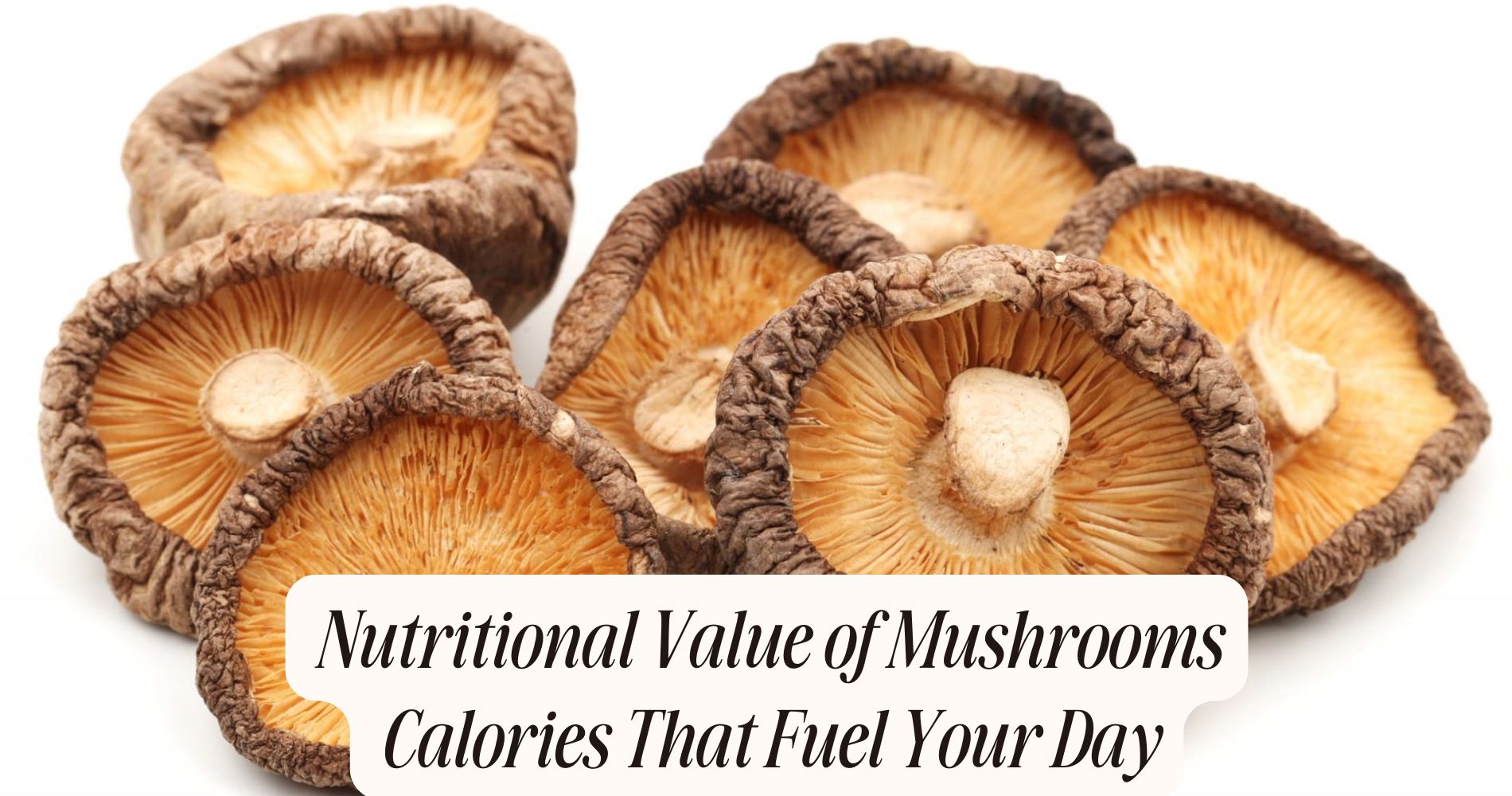
Nutritional Value of Mushrooms Calories That Fuel Your Day
Overview of Mushroom Varieties
When it comes to mushrooms, you'll find a fascinating variety that spans both culinary and medicinal uses. Mushrooms aren't just delicious; they also boast significant nutritional benefits.
In culinary contexts, some of the most popular varieties include button, shiitake, and portobello mushrooms. Each offers unique flavors and textures, making them versatile ingredients in countless dishes.

Mushroom cultivation has gained popularity as more people recognize the value of growing their own food. Cultivating mushrooms can be done at home with simple kits or through more advanced techniques for those looking to produce larger yields. This process allows for fresh, organic mushrooms that enhance the flavor profiles of your meals.
In addition to culinary uses, certain mushrooms like reishi and lion's mane are revered for their medicinal properties. They've been linked to various health benefits, including immune support and cognitive enhancement.
Caloric Content of Mushrooms
When you consider the caloric content of mushrooms, it's important to recognize the variety of types available, each with its own unique profile.
By comparing the caloric density of popular mushrooms, you can better appreciate their low-calorie nature while also exploring the health benefits they offer.
Understanding these factors helps you make informed dietary choices that incorporate these nutritious fungi.
Types of Mushrooms
Mushrooms aren't only a versatile ingredient in various dishes but also come in a wide range of types, each with its unique caloric content. You'll find numerous edible varieties, including white button, shiitake, and portobello, each offering distinct flavor profiles and culinary uses.
For example, shiitake mushrooms are rich in umami and often used in Asian cuisine, while portobello's meaty texture makes it a great substitute for meat.
When exploring medicinal mushrooms like reishi and lion's mane, you'll discover their potential health benefits, which can complement your diet. If you're interested in mushroom cultivation, you can grow your own seasonal mushrooms at home, enhancing your meals while controlling caloric intake.
Foraging tips can help you identify wild mushrooms, but be cautious, as some toxic mushrooms can be easily mistaken for edible ones. Proper mushroom storage is essential to maintain freshness, and employing various cooking techniques, such as sautéing or grilling, can enhance their flavors.
Caloric Density Comparison
In exploring the caloric density of different mushroom varieties, you'll find that these fungi offer a low-calorie option while providing essential nutrients.
For instance, white mushrooms contain just about 22 calories per 100 grams, making them an excellent choice for calorie-conscious eaters. On the other hand, portobello mushrooms, while slightly higher, still come in at around 30 calories for the same serving size.
When you perform a nutritional comparison among mushrooms, you'll notice that they pack a variety of vitamins and minerals, such as vitamin D, selenium, and B vitamins, with minimal caloric impact.
Shiitake mushrooms are another great example, with a caloric density of about 34 calories per 100 grams, offering unique flavors along with their nutritional benefits.

Health Benefits Overview
A diverse range of health benefits comes from incorporating mushrooms into your diet, particularly considering their low caloric content. Many mushroom varieties, such as shiitake, portobello, and cremini, aren't only low in calories but also rich in essential nutrients, making them a smart choice for anyone looking to maintain a balanced diet.
Research indicates that mushrooms are a great source of antioxidants, which help combat oxidative stress in your body. They contain important vitamins like B vitamins, which support energy metabolism, and vitamin D, vital for bone health.
Additionally, the fiber found in mushrooms can aid digestion and promote a healthy gut microbiome, aligning with current health trends focused on gut health.
Moreover, some studies suggest that certain mushroom varieties, like reishi and lion's mane, may offer additional cognitive benefits and immune support. By incorporating these nutrient-dense foods into your meals, you can enhance your overall well-being while enjoying their unique flavors.
Vitamins Found in Mushrooms
Packed with essential nutrients, mushrooms serve as a valuable source of vitamins that contribute to overall health.
They're particularly known for providing B vitamins, including riboflavin (B2), niacin (B3), and pantothenic acid (B5). These vitamins play important roles in energy metabolism, helping your body convert food into fuel. Including mushrooms in your diet can enhance your energy levels and support your daily activities.
Additionally, mushrooms are one of the few non-animal vitamin D sources, especially when exposed to sunlight. This vitamin is crucial for bone health and immune function. By choosing mushrooms as part of your meals, you tap into these significant vitamin sources that offer various mushroom benefits.
Moreover, mushrooms also contain small amounts of other vitamins like C and K, which are necessary for skin health and blood clotting, respectively. This makes mushrooms a versatile addition to a balanced diet.
Minerals in Mushrooms
Mushrooms aren't just rich in vitamins; they also provide a variety of essential minerals that support fundamental bodily functions. These fungi are good sources of potassium, phosphorus, and selenium, each playing a unique role in your health.
Potassium helps regulate blood pressure and fluid balance, while phosphorus supports bone health and energy production. Selenium is a powerful antioxidant that contributes to immune function.
What's particularly interesting is how mushrooms enhance mineral absorption in your body. They contain compounds that can improve your ability to absorb nutrients from other foods, making them a valuable addition to your meals.
Additionally, mushrooms contain trace elements like copper and zinc, which are important for immune support and cellular function.
Incorporating mushrooms into your diet can help you meet your mineral needs naturally. Whether you enjoy them sautéed, grilled, or in soups, these versatile ingredients can boost both your nutrition and culinary experience.
Antioxidants and Their Benefits
Incorporating antioxidants into your diet can greatly enhance your health and well-being. Antioxidants are compounds that help neutralize free radicals in your body, which can cause oxidative stress and lead to various health issues. By including antioxidant sources like mushrooms, fruits, and vegetables in your meals, you can support your body's natural defense mechanisms.
Mushrooms, in particular, are a rich source of antioxidants such as ergothioneine and glutathione. These compounds may help reduce inflammation and protect your cells from damage. Research indicates that consuming foods high in antioxidants can improve your overall health impacts, potentially lowering the risk of chronic diseases like heart disease and certain cancers.

In addition to their protective effects, antioxidants may also support your immune system, enhance skin health, and promote cognitive function. By prioritizing foods rich in these beneficial compounds, you can make informed dietary choices that contribute to your long-term health.
Integrating mushrooms into your meals not only adds flavor but also boosts your intake of these essential antioxidants, making it an easy and delicious way to enhance your diet.
Health Benefits of Mushrooms
Mushrooms offer a range of health benefits that can enhance your well-being.
They support your immune system, provide antioxidant properties, and are nutrient-dense, making them a valuable addition to your diet.
Immune System Support
When it comes to bolstering your immune system, few foods can match the unique benefits that mushrooms offer. Research shows that various mushroom compounds, including beta-glucans and polysaccharides, can greatly enhance your immune response. These components work by activating immune cells, such as macrophages and natural killer cells, which play vital roles in defending your body against pathogens.
Mushrooms like shiitake, reishi, and maitake are particularly noted for their immune-supporting properties. For instance, reishi mushrooms contain triterpenes that not only modulate the immune system but also help reduce inflammation. By incorporating these mushrooms into your diet, you can promote a balanced immune response, helping your body react more effectively to infections.
Moreover, mushrooms are low in calories and rich in vitamins and minerals, including vitamin D, which is essential for immune function. Regular consumption of mushrooms can provide your body with the necessary nutrients to support overall health.
Antioxidant Properties
Beyond their immune-boosting properties, mushrooms also shine as a rich source of antioxidants, which play a significant role in overall health.
These compounds help combat oxidative stress, a condition linked to various chronic diseases. By incorporating mushrooms into your diet, you're tapping into powerful antioxidant sources like ergothioneine and selenium.
Ergothioneine, in particular, is a unique antioxidant found mainly in mushrooms, known for its ability to protect cells from damage caused by free radicals.
Consuming foods high in antioxidants can have positive health implications, such as reducing inflammation and lowering the risk of heart disease and certain cancers.
Additionally, mushrooms contain other beneficial compounds that work synergistically with antioxidants, enhancing their effects.
By regularly including mushrooms in your meals, you're not just adding flavor but also bolstering your body's defenses against cellular damage.
Incorporating a variety of mushroom types can maximize your intake of these antioxidants and support overall well-being.
Nutrient Density
One of the most compelling reasons to include mushrooms in your diet is their impressive nutrient density. Mushrooms are low in calories yet packed with essential vitamins and minerals, making them a fantastic choice for maintaining dietary balance. They contain essential nutrients like B vitamins, selenium, and potassium, all of which play significant roles in your body's functioning.
Incorporating mushrooms into your meals can enhance nutrient absorption, as their high fiber content aids digestion and promotes a healthy gut. This is particularly important when you're trying to optimize the benefits of other nutrient-rich foods. For example, pairing mushrooms with foods high in vitamin C, such as bell peppers, can boost iron absorption, helping you get the most out of your meals.
Moreover, different varieties of mushrooms offer unique health benefits. For instance, shiitake mushrooms are known for their immune-boosting properties, while portobellos provide a hearty, meat-like texture to vegetarian dishes.
Ways to Incorporate Mushrooms
Incorporating mushrooms into your diet can elevate both the flavor and nutritional profile of your meals. You can use various cooking techniques to maximize their benefits. Sautéing mushrooms in a bit of olive oil enhances their umami flavor and retains their nutrients.
Roasting them brings out their natural sweetness and gives a delightful texture. You might also consider grilling mushrooms, which adds a smoky flavor that pairs well with many dishes.

When it comes to mushroom pairings, think about what complements their unique taste. Mushrooms work beautifully with garlic, herbs like thyme or rosemary, and even citrus zest. They can be a fantastic addition to stir-fries, salads, or soups.
Don't forget about incorporating them into sauces or pasta dishes, where their texture and flavor can truly shine.
If you're looking for a quick and nutritious boost, blend mushrooms into smoothies or omelets for breakfast. By experimenting with different varieties—like shiitake, portobello, or cremini—you'll discover new flavors and textures that can enhance your meals.
With these methods, you'll easily enjoy the vast nutritional benefits mushrooms have to offer.
Comparing Mushrooms to Other Foods
While many foods offer nutritional benefits, mushrooms stand out due to their unique combination of low calories, high fiber, and essential nutrients.
When you compare mushrooms to other vegetables, you'll notice they often contain fewer calories, making them an excellent choice for weight management. For instance, a cup of cooked mushrooms typically has about 35 calories, while the same serving of cooked spinach has around 41 calories.
Mushrooms also possess a distinct umami flavor profile, which can enhance a variety of dishes. This sets them apart from many other vegetables that may rely on spices or sauces for flavor.
Depending on the cooking methods you choose—whether sautéing, grilling, or roasting—mushrooms can absorb and complement other flavors while adding their own depth.
Additionally, when you stack mushrooms against proteins like chicken or beef, they provide a plant-based alternative that's low in fat and high in nutrients like selenium and vitamin D.
Recipe Ideas Featuring Mushrooms
Exploring recipe ideas featuring mushrooms opens up a world of culinary possibilities, thanks to their versatility and rich umami flavor. You can start with stuffed mushrooms, perfect as appetizers or snacks.
For a hearty main dish, try mushroom risotto, which combines creamy arborio rice with sautéed mushrooms for a comforting meal.
Don't overlook the classic mushroom soup; it's simple to make and packed with flavor. If you're looking for something lighter, sautéed mushrooms can be a great addition to salads or served as a side dish.
For a twist, consider mushroom tacos, where mushrooms take center stage in a flavorful filling. Or, indulge in a delicious mushroom pizza topped with your choice of cheese and herbs.
If you're in the mood for pasta, creamy mushroom pasta offers a rich and satisfying option. You can also whip up a quick mushroom stir fry with fresh vegetables for a nutritious weeknight dinner.
Boost Your Daily Nutrition with 10-IN-1 MUSHROOM GUMMIES
While learning about the nutritional value of mushrooms calories, consider adding Well Gummies’ 10-IN-1 MUSHROOM GUMMIES to your routine for a simple and effective boost. Each vegan gummy includes 10 powerful mushrooms, providing essential nutrients for immune support, calm energy, and mental clarity without adding extra calories to your diet. With a delicious wild berry flavor, these gummies are as enjoyable as candy, but they deliver sustained focus and balanced energy—no jitters, no crash. Make these nutrient-packed gummies a part of your daily wellness for natural, convenient support.
Frequently Asked Questions
Are There Any Mushrooms That Should Be Avoided for Health Reasons?
Yes, you should avoid toxic species like Amanita and some wild mushrooms. Stick to identifiable edible varieties to guarantee your safety. Always research or consult experts before consuming any unfamiliar mushrooms to prevent health risks.
How Do Cooking Methods Affect the Nutritional Value of Mushrooms?
Cooking techniques greatly impact mushrooms' nutrient retention. Steaming or sautéing preserves more vitamins compared to boiling, which can leach nutrients. Experimenting with different methods helps you maximize their health benefits while enjoying diverse flavors.
Can Mushrooms Cause Allergic Reactions in Some Individuals?
Yes, mushrooms can cause allergic reactions in some individuals. If you're allergic, your immune response may trigger symptoms like hives or difficulty breathing. It is crucial to identify and avoid specific mushroom varieties that provoke these reactions.
What Are the Best Storage Practices for Fresh Mushrooms?
To store fresh mushrooms, refrigerate them in a paper bag for moisture control. Avoid plastic bags, as they trap moisture. Keep them in the vegetable drawer, and use them within a week for best quality.
Are There Any Potential Side Effects of Consuming Mushrooms Regularly?
While mushrooms offer benefits, consuming them regularly can lead to mushroom toxicity in certain varieties and potential digestive issues for some individuals. Always choose edible types and monitor your body's response for any adverse effects.
Conclusion
Incorporating mushrooms into your diet can greatly enhance your nutritional intake. With their low caloric content and rich profile of vitamins, minerals, and antioxidants, mushrooms serve as a versatile food choice that supports overall health. Whether you enjoy them in a stir-fry, salad, or soup, you'll not only savor their unique flavors but also benefit from their numerous health advantages. Embrace mushrooms as a delicious way to fuel your day and elevate your meals.




